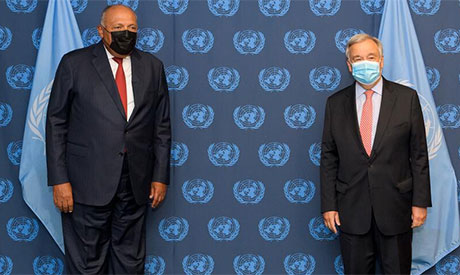
UN Secretary-General Antonio Guterres with Egyptian Foreign Minister Sameh Shoukry before their meeting in New York on Wednesday July 7, 2021. Photo courtesy of UN website
Egypt’s Foreign Minister Sameh Shoukry asked the international parties, topped by the United Nations (UN) and the UN Security Council (UNSC), to assume the responsibility and push Ethiopia to engage in serious negotiations and in good faith to reach a fair deal on the dam dispute.
In a meeting with UN Secretary-General Antonio Guterres in New York on Wednesday evening, Shoukry reviewed Egypt’s stance concerning the Grand Ethiopian Renaissance Dam (GERD).
The meeting is part of Shoukry’s ongoing meetings with UN members and other parties to brief them on Egypt’s position on Ethiopia’s controversial dam, ahead of the UNSC session to debate the matter on Thursday.
The UNSC’s meeting will be held upon the request of Egypt and Sudan, who raised the matter with the 15-member body after the African Union-sponsored tripartite negotiations with Ethiopia reached a deadlock earlier this year.
Shoukry reiterated to the UN chief the urgent need to hash out a legally binding agreement on the filling and operation of the dam, taking into account the water interests of the parties involved, according to a statement by Ministry Spokesman Ahmed Hafez.
He also emphasised Egypt’s “categorical” rejection of Ethiopia’s unilateral move to proceed with the dam’s 2nd filling, of which the upstream country notified Egypt and Sudan on Monday despite the lack of a legal agreement between the three countries.
The step, Shoukry said, aims to impose a fait accompli on downstream countries and constitutes a “flagrant” breach of international law and norms, as well as the Declaration of Principles signed by Egypt, Sudan, and Ethiopia in 2015.
Shoukry also warned of the “grave” consequences of such unilateral actions on regional security and stability.
Both downstream countries see eye to eye on the importance of securing a legal deal guaranteeing binding rules for filling and operating the Ethiopian dam in a manner that does not cause significant harm to the Egyptian and Sudanese peoples, who rely on the Nile as a main source of fresh water.
Egypt, which relies on the Nile River for more than 95 percent of its renewable water resources, fears the unilateral filling and operation of the massive dam will significantly diminish its water supply, which at 560 cubic metres per person annually, is already well below the international threshold for water scarcity.
The country, whose 100 million-plus population is expected to increase by 75 million by 2050, is considered one of the most water-scarce countries in the world, as it receives around 60 bcm annually — the majority of which flows from the River Nile — though its needs stand at 114 bcm.
Sudan said the unilateral filling of the GERD would threaten the lives of millions of its people living downstream of the dam, jeopardise the operational safety of its dams, and consequently risk Sudan’s national security.
Tunisia, the only Arab member of the 15-member body, submitted last Friday an Egyptian-Sudanese GERD-focused draft resolution to the UN body, calling on the three nations to resume negotiations at the joint invitation of the chairperson of the AU and the secretary-general of UN to finalise the text of a binding agreement on the filling and operation of the GERD by January 2022.
Short link: